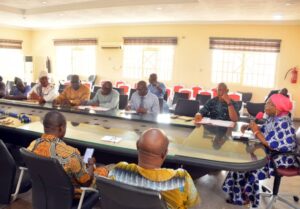Land Dispute: EKSG Cautions Against Rising Litigations, Disunity Among Ekiti Towns
The Ekiti State Government, yesterday directed the Boundary Dispute Resolution Technical Committee to proceed on immediate demarcation of disputed farmland between Iloro and Odo Owa Ekiti, in Ijero Local Government Area of the State to resolve the lingering crisis in the area.
The state government urged all the feuding towns in Ekiti to always embrace deployment of internal mechanisms provided by the State to resolve boundary matters before resorting to litigation to entrench unity and ward off acrimony among the towns.
The Deputy Governor, Chief (Mrs) Monisade Afuye, gave the directive in Ado Ekiti, on Thursday, while intervening in a land dispute between Odo Owa and Iloro Ekiti, all in Ijero Local Government Area of the State.
The troubleshooting effort was sequel to a petition written to government by the Olowa of Odo-Owa Ekiti , Oba Ayorinde Oyedeji, accusing Iloro people of encroaching on their lands and harassing his subjects on their farmland.
While presiding over the matter, the Deputy Governor, in a statement signed by her Special Assistant on Media, Victor Ogunje, suggested amicable resolution of the tussle, in spite of the fact that the issue had been taken to two hierarchy of courts, with judgments already delivered.
The Deputy Governor called the attentions of the stakeholders from the two feuding towns to the imperative of using internal mechanisms to resolve land matters, instead of litigation, because the crisis still persists in spite of the existing court judgements.
“We thank God that this matter is not between a town in Ekiti and a neighbouring state. You are all Ekiti people, so go home and resolve this matter. You have intermarried, you have many things in common; don’t let us allow those who owned plantations in that place to lose them on the basis of this matter that can be resolved.
“Your forefathers existed on that farmland with love and without rancour, try and toe this path. Iloro people who said they secured favourable judgements from Court can still allow the farmers from Odo Owa Ekiti to own their cocoa and other plantations by way of working out modalities that will appease the two sides. There are ways you can do this.
“I hereby direct the Government’s Technical Committee to meet with the two towns and get a date when they will come and do proper demarcation in that area to allow peace to reign”.
Shedding light on the petition written to government, Oba Oyedeji, said the battle over the ownership of the disputed farmland started long ago, following which the town proceeded on a litigation up to the appeal court.
The traditional ruler clarified that the High and Appeal Courts didn’t make any categorical statement in their judgements over the ownership of the land, nor barred his subjects from farming and in the disputed area, contrary to position being touted by Iloro Ekiti people, who were laying claim to have got favourable judgements.
The monarch frowned at the way his subjects who owned large expanse of cocoa and palm tree plantations were being harassed by Iloro people, whom he alleged were making frantic attempt to forcefully take possession of their economic trees.
But in his response, the Oluloro of Iloro Ekiti, Oba Olufemi Olugbesoye, said the two judgements from the courts were dispensed in favour of Iloro Ekiti, with fine of N30,000 slammed Odo Owa for trespass.
The monarch added that the 2012 judgement delivered by Justice Cornelius Akintayo of the Ekiti State High Court resolved the issue against Odo Owa and struck out their case for lacking in merit, which he said indicated that land under dispute belonged to Iloro community.
Speaking further, the royal father said what he expected the complainant to say is to appeal to government to demarcate the area in line with the judgement to avert internal strife.
“With that two court judgements and a fine if N30,000 imposed on the complainant, the ownership of that land is not in contest. What we need is proper demarcation in line with the judgement delivered at the High Court and affirmed by the Appeal Court”.
